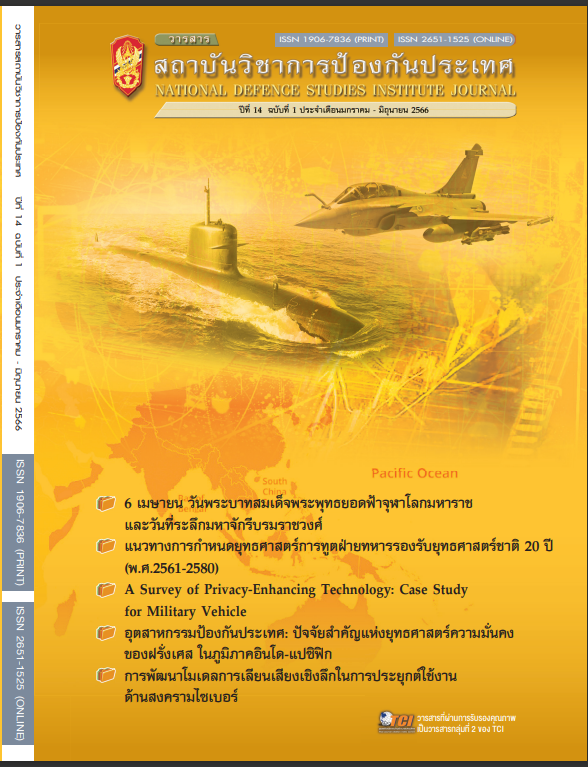การแข่งขันทางยุทธศาสตร์ของสหรัฐอเมริกาและสาธารณรัฐประชาชนจีนในอินโด-แปซิฟิกกับการกำหนดท่าทีและนโยบายทางด้านการทหารที่เหมาะสมของประเทศไทย
Main Article Content
บทคัดย่อ
ภูมิรัฐศาสตร์ อินโด-แปซิฟิกเป็นพื้นที่ช่วงชิงการนำ ทำให้เกิดความสัมพันธ์เชิงซ้อนระหว่างรัฐต่อรัฐ มีการจับขั้วแบ่งข้าง ตลอดจนกำหนดกรอบความร่วมมือต่าง ๆ ทำให้ประเทศไทยจำเป็นต้องปรับยุทธศาสตร์เพื่อให้สอดรับกับสถานการณ์ดังนั้น ประเทศไทยจึงมีทั้งโอกาสและความท้าทายที่จะกำหนดบทบาทและท่าทีที่ควรจะเป็นที่เหมาะสม
จากการศึกษาสรุปได้ว่าประเทศไทยต้องดำเนินนโยบายยุทธศาสตร์ทางทหารที่สมดุล (Balancing Military Strategy) กล่าวคือ รักษาสมดุลที่เหมาะสมกับผลประโยชน์ของประเทศชาติใช้แบบ (Model) ที่ประเทศไทยมีสภาพที่ตั้งทางภูมิศาสตร์ที่เกื้อกูลและเป็นศูนย์กลางการเชื่อมโยงและเป็นแกนหลักในอาเซียนขยายกรอบความร่วมมือทางทหารไปยังประเทศมหาอำนาจอื่นผนึกกำลังร่วมกับเพื่อนบ้านอาเซียน ในขณะเดียวกันต้องขยายความสัมพันธ์ด้านการทหารกับสาธารณรัฐอินเดีย (อินเดีย) และสหพันธรัฐรัสเซีย (รัสเซีย) เพื่อสร้างการต่อรองผลประโยชน์ ในขณะเดียวกันต้องสร้างความร่วมมือหลากหลายต้องดำรงสถานะในการเป็นมิตรหรือไม่เป็นปรปักษ์ของทั้งสองฝ่ายกระจายความพึ่งพามีความใกล้ชิดแต่มีระยะห่าง ที่แตกต่าง ขยายความร่วมมือทางด้านการทหาร ด้านการฝึกร่วมผสม ตลอดจนดำเนินการทางการทูตฝ่ายทหารให้มีความสอดประสานไม่เลือกข้างแม้จะถูกกดดันให้เลือกข้างเป็นสะพานเชื่อมโยงความสัมพันธ์ระหว่างสหรัฐอเมริกา (สหรัฐฯ) และสาธารณรัฐประชาชนจีน (จีน) ซึ่งความใกล้ชิดนี้เป็นความใกล้ชิดที่จะต้องไม่ทำให้สหรัฐฯ และจีนเกิดความไม่พอใจ กล่าวคือ ต้องไม่ให้อีกฝ่ายมองประเทศไทยไม่เป็นมิตรที่เรียกว่าเป็นกลางอย่างเหมาะสมทั้งในเวทีโลก เวทีภูมิภาค มีระยะห่างที่แตกต่างกันต้องไม่ตกเป็นเครื่องมือ ในการต่อต้านของอีกฝ่ายหนึ่ง ไม่เลือกข้างใดข้างหนึ่งหรือเอียงไปด้านใดด้านหนึ่ง ซึ่งอาจจะมีสัมพันธไมตรีกับจีนอย่างแนบแน่น ขณะเดียวกันก็รักษาความสัมพันธ์กับสหรัฐฯ ไว้ ซึ่งการรักษาสมดุลเช่นนี้ต้องยอมรับว่าจะไม่ได้รับผลประโยชน์จากแต่ละฝ่ายเท่าที่ควรซึ่งขณะเดียวกันก็จะไม่ถูกกดดันจากฝ่ายใดฝ่ายหนึ่งมากนัก ไม่เข้าไปช่วยฝ่ายใดฝ่ายหนึ่งมากเกินไปจนเกิดความได้เปรียบเสียเปรียบกัน ซึ่งไม่ใช่เรื่องง่ายแต่เป็นสิ่งจำเป็นที่ต้องปฏิบัติเพื่อเสถียรภาพของประเทศและผลประโยชน์ของประเทศชาติเป็นหลัก
Article Details

อนุญาตภายใต้เงื่อนไข Creative Commons Attribution-NonCommercial-NoDerivatives 4.0 International License.
บทความ ภาพ ตาราง กราฟ ข้อเขียน หรือความคิดเห็นในวารสารฉบับนี้เป็นของผู้เขียนไม่ผูกพันกับสถาบันวิชาการป้องกันประเทศ และทางวิชาการแต่อย่างใด
เอกสารอ้างอิง
กระทรวงกลาโหม. (2560). ยุทธศาสตร์การป้องกันประเทศกระทรวงกลาโหม พ.ศ.2560-2579. กรุงเทพฯ. กระทรวงกลาโหม, สำนักนโยบายและแผนกลาโหม. (2560). แนวทางการเสริมสร้างความร่วมมือด้านความมั่นคงกับมิตรประเทศของกระทรวงกลาโหม 2560-2564. กรุงเทพฯ: สำนักนโยบายและแผนกลาโหม.
คณะกรรมการยุทธศาสตร์ชาติ. (2561). ยุทธศาสตร์ชาติ พ.ศ.2561-2580. กรุงเทพฯ: สำนักพิมพ์คณะรัฐมนตรี.
สุรชาติ บำรุงสุข. (2549). รัฐใหญ่แพ้สงครามเล็กอย่างไร.กรุงเทพฯ: สำนักพิมพ์สถาบันข่าวกรองแห่งชาติ.
Nye, J. S. Jr. (2007). Understanding International Conflicts: An Introduction to Theory and History. Crawfordsville: RR Donnelley and Sons Company.


